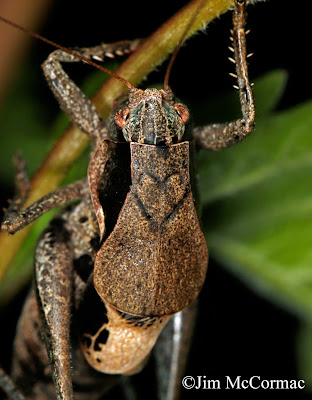The wet, slushy worst of Ohio's winter is upon us. Right now it's about 50 F with rain. Today featured the leaden skies that we see so much of in winter. Temperatures have been yo-yo'ing all over the place, from semi-balmy to downright frigid.
Fortunately, tomorrow is Winter Solstice, and after that the days grow longer, leading us by our Seasonal Affective Disordered brains ever closer to spring and the re-emergence of life. Especially insect life! I dip into the files to share a cool bug that I meant to write about long ago, but just never got around to. It may evoke memories of warmer, longer days.
It isn't hard to see how this group of katydids (subfamily Tettigoniinae) gets its name. The animal looks as if it has been fitted with armor plating. Despite their tanklike appearance, these are very interesting and ornate insects. There are several dozen species in the U.S., although only a handful occur in Ohio. Because their songs tend to be soft and easily overlooked, the group in general is probably not that well known.
We finally brought the animal out of the grasses for a photo shoot, and so that at all who were present could admire it. While these katydids will forage on vegetation, they often eschew the vegetarian lifestyle and scavenge dead insects, and will even overpower and consume live insects when chance permits.
I look forward to warmer days ahead, when singing insects such as this shieldback contribute their melodies to warm summer days and nights.


